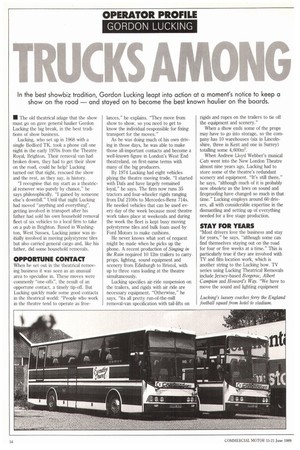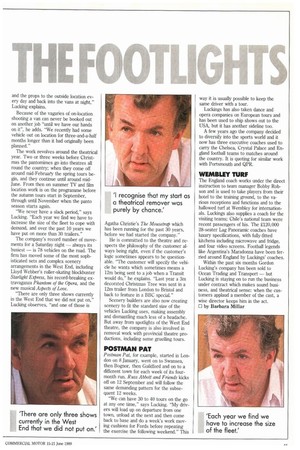"RUCKS Mit* U.
Page 56

Page 57

If you've noticed an error in this article please click here to report it so we can fix it.
THE RSA
In the best showbiz tradition, Gordon Lucking leapt into action at a moment's notice to keep a show on the road — and stayed on to become the best known haulier on the boards.
• The old theatrical adage that the show must go on gave general haulier Gordon Lucking the big break, in the best traditions of show business.
Lucking, who set up in 1968 with a single Bedford TK, took a phone call one night in the early 1970s from the Theatre Royal, Brighton. Their removal van had broken down, they had to get their show on the road, could he help? Lucking turned out that night, rescued the show and the rest, as they say, is history.
"I recognise that my start as a theatrical remover was purely by chance," he says philosophically. "I gained by someone else's downfall." Until that night Lucking had moved "anything and everything", getting involved in transport after his father had sold his own household removal fleet of six vehicles to a local firm to take on a pub in Brighton. Based in Washington, West Sussex, Lucking junior was initially involved in moving polystyrene tiles but also carried general cargo and, like his father, did some household removals.
OPPORTUNE CONTACT
When he set, out in the theatrical removing business it was seen as an unusual area to specialise in. These moves were commonly "one-offs", the result of an opportune contact, a timely tip-off. But Lucking quickly made some good contacts in the theatrical world: "People who work in the theatre tend to operate as free lances," he explains. "They move from show to show, so you need to get to know the individual responsible for fixing transport for the moves."
As he was doing much of his own driving in those days, he was able to make those all-important contacts and become a well-known figure in London's West End theatreland, on first-name terms with many of the big producers.
By 1974 Lucking had eight vehicles plying the theatre moving trade. "I started with Dais and have largely remained loyal," he says. The firm now runs 35 tractors and four-wheeler rigids ranging from Daf 2100s to Mercedes-Benz 714s. He needed vehicles that can be used every day of the week because most theatre work takes place at weekends and during the week the fleet is kept busy moving polystyrene tiles and bulk foam used by Ford Motors to make cushions.
He never knows what sort of request might be made when he picks up the phone. A recent production of Singing in the Rain required 10 12m trailers to carry. props, lighting, sound equipment and scenery from Edinburgh to Bristol, with up to three vans loading at the theatre simultaneously.
Lucking specifies air-ride suspension on the trailers, and rigids with air ride are necessary equipment. "Otherwise," he says, "its all pretty run-of-the-mill removal-van specification with tail-lifts on rigids and ropes on the trailers to tie off the equipment and scenery."
When a Show ends some of the props may have to go into storage, so the company has 10 warehouses (six in Lincolnshire, three in Kent and one in Surrey) totalling some 4,600e.
When Andrew Lloyd Webber's musical Cats went into the New London Theatre almost nine years ago, Lucking had to store some of the theatre's redundant scenery and equipment. "It's still there," he says, "although much of it is probably now obsolete as the laws on sound and fireproofing have changed so much in that time." Lucking employs around 60 drivers, all with considerable expertise in the dismantling and setting up of everything needed for a live stage production.
STAY FOR YEARS
"Most drivers love the business and stay for years," he says, "although some can find themselves staying out on the road for four or five weeks at a time." This is particularly true if they are involved with TV and film location work, which is another string to the Lucking bow. TV series using Lucking Theatrical Removals include Jersey-based Bergerac, Albert Campion and Howard's Way. "We have to move the sound and lighting equipment and the props to the outside location every day and back into the vans at night," Lucking explains.
Because of the vagaries of on-location shooting a van can never be booked out on another job "until we have our hands on it", he adds. "We recently had some vehicle out on location for three-and-a-half months longer than it had originally been planned."
The work revolves around the theatrical year. Two or three weeks before Christmas the pantomimes go into theatres all round the country; when they come off around mid-February the spring tours begin, and they continue until around midJune. From then on summer TV and film location work is on the programme before the autumn tours start in September, through until November when the panto season starts again.
"We never have a slack period," says Lucking. "Each year we find we have to increase the size of the fleet to cope with demand, and over the past 10 years we have put on more than 30 trailers."
The company's record number of movements for a Saturday night — always its busiest — is 78 vehicles on the road. The firm has moved some of the most sophisticated sets and complex scenery arrangements in the West End, including Lloyd Webber's roller-skating blockbuster Starlight Express, his record-breaking extravaganza Phantom of the Opera, and the new musical Aspects of Love.
"There are only three shows currently in the West End that we did not put on," Lucking observes, "and one of those is
Agatha Christie's The Mousetrap which has been running for the past 30 years, before we had started the company."
He is committed to the theatre and respects the philosophy of the customer always being right, even if the customer's logic sometimes appears to be questionable. "The customer will specify the vehicle he wants which sometimes means a 12m being sent to a job when a Transit would do," he explains. "Last year a 3m decorated Christmas Tree was sent in a 12m trailer from London to Bristol and back to feature in a BBC special."
Scenery builders are also now creating scenery to fit the standard size of the vehicles Lucking uses, making assembly and dismantling much less of a headache. But away from spotlights of the West End theatre, the company is also involved in removal work with provincial theatre productions, including some gruelling tours.
POSTMAN PAT
Postman Pat, for example, started in London on 8 January, went on to Swansea, then Bognor, then Guildford and on to a different town for each week of its fourmonth run. Russ Abbott and Friends kicks off on 12 September and will follow the same demanding pattern for the subsequent 12 weeks.
"We can have 30 to 40 tours on the go at any one time," says Lucking. "My drivers will load up on departure from one town, unload at the next and then come back to base and do a week's work moving cushions for Fords before repeating the exercise the following weekend," This way it is usually possible to keep the same driver with a tour.
Luckings has also taken dance and opera companies on European tours and has been used to ship shows out to the USA, but it has another sideline too.
A few years ago the company decided to diversify into the sports world and it now has three executive coaches used to carry the Chelsea, Crystal Palace and England football teams to matches around the country. It is quoting for similar work with Portsmouth and QPR.
WEMBLEY TURF
The England coach works under the direct instruction to team manager Bobby Robson and is used to take players from their hotel to the training ground, to the various receptions and functions and to the hallowed turf at Wembley for internationals. Luckings also supplies a coach for the visiting teams; Chile's national team were recent passengers of his. The £120,000 28-seater Lag Panoramic coaches have luxury specifications, with fully-fitted kitchens including microwave and fridge, and four video screens. Football legends like Argentina's Maradonna have been ferried around England by Luckings' coaches.
Within the past six months Gordon Lucking's company has been sold to Ocean Trading and Transport — but Lucking is staying on to run the business under contract which makes sound business, and theatrical sense: when the customers applaud a member of the cast, a wise director keeps him in the act. O by Barbara Millar




























































































































































































